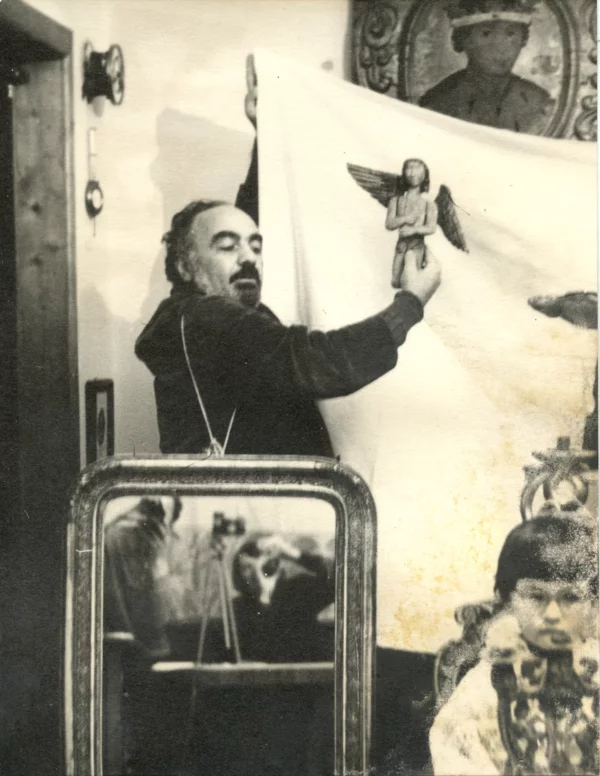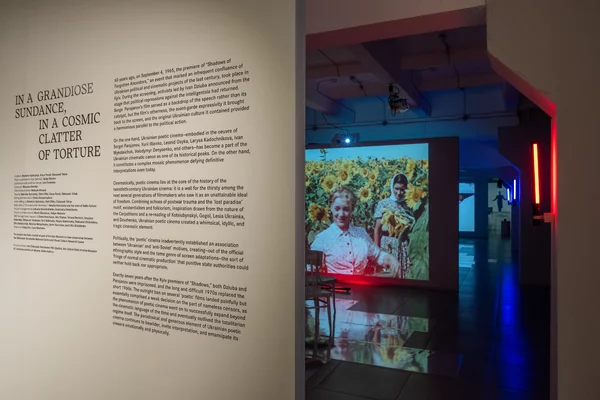In a Grandiose Sundance, in a Cosmic Clatter of Torture
60 years ago, on September 4, 1965, the premiere of Shadows of Forgotten Ancestors, an event that marked an infrequent confluence of Ukrainian political and cinematic projects of the last century, took place in Kyiv. During the screening, activists led by Ivan Dziuba announced from the stage that political repressions against the intelligentsia had returned. Sergei Parajanov’s film served as a backdrop of the speech rather than its catalyst, but the film’s otherness, the avant-garde expressivity it brought back to the screen, and the original Ukrainian culture it contained provided a harmonious parallel to the political action.
On the one hand, Ukrainian poetic cinema — embodied in the oeuvre of Sergei Parajanov, Yurii Illienko, Leonid Osyka, Larysa Kadochnikova, Ivan Mykolaichuk, Volodymyr Denysenko, and others — has become a part of the Ukrainian cinematic canon as one of its historical peaks. On the other hand, it constitutes a complex mosaic phenomenon defying definitive interpretations even today.
Cinematically, poetic cinema lies at the core of the history of the twentieth-century Ukrainian cinema: it is a well for the thirsty among the next several generations of filmmakers who saw it as an unattainable ideal of freedom. Combining echoes of postwar trauma and the “lost paradise” motif, existentialism and folklorism, inspiration drawn from the nature of the Carpathians and a re-reading of Kotsiubynskyi, Gogol, Lesia Ukrainka, and Dovzhenko, Ukrainian poetic cinema created a whimsical, idyllic, and tragic cinematic element.
Politically, the “poetic” cinema inadvertently established an association between “Ukrainian” and “anti-Soviet” motives, creating — out of the official ethnographic style and the tame genre of screen adaptations — the sort of “fringe of normal cinematic production” that punitive state authorities could neither hold back nor appropriate.
Exactly seven years after the Kyiv premiere of Shadows, both Dziuba and Parajanov were imprisoned, and the long and difficult 1970s replaced the short 1960s. The outright ban on several “poetic” films landed painfully but essentially comprised a weak decision on the part of nameless censors, as the phenomenon of poetic cinema went on to successfully expand beyond the cinematic language of the time and eventually outlived the totalitarian regime itself. The paradoxical and generous element of Ukrainian poetic cinema continues to bewilder, invite interpretation, and emancipate its viewers emotionally and physically.
Curators: Stanislav Bytiutskyi, Alona Penzii, Oleksandr Teliuk.
Participants: Yurii Ilin-Adaiev, Roman Balaian, Oleh Biima, Yurii Bondarenko, Anatolii Devianin, Yurii Illienko, Viktor Ivanov, Borys Ivchenko, Vadym Kalutskyi, Maksym Khodak, Maryana Klochko, Nataliia Kolomiiets, Viacheslav Kryshtofovych, Oleksandr Kybalnyk, Tamara Liashchuk, Oleksandr Melnyk, Oleksii Moroz, Oleksandr Dovzhenko Film Studios, Leonid Osyka, Sergei Parajanov, Radio Kultura, Mykhailo Sachenko, Volodymyr Saveliev, Rollan Serhiienko, Viktor Zhylko
Project coordination (Kyiv Biennial): Serhii Klymko.
Architecture and exhibition design: Lera Guievska.
Composer: Maryana Klochko.
Commissioned artist: Maksym Khodak.
Texts by Stanislav Bytiutskyi, Oleh Olifer, Alona Penzii, Oleksandr Teliuk.
Editing and translation: Olesia Kamyshnykova.
Video editing by Stanislav Bytiutskyi, Oleh Olifer, Oleksandr Teliuk.
Radio drama The Impossible Intermezzo: Nataliia Kolomiiets and the team of Radio Kultura.
Production manager: Avhusta Samoilichenko.
Thanks to Olena Honcharuk, Vasylyna Polianska, Ostap Kin, Iryna Slavinska.
The project has been created as part of the Kyiv Biennial in close cooperation between the Oleksandr Dovzhenko National Centre and Visual Culture Research Center.
Project partners: the Oleksandr Dovzhenko Film Studios, the Central State Archive Museum of Literature and Art of Ukraine, Radio Kultura.
Supported by: Creative Europe, Ribbon International, Sigrid Rausing Trust, Foundation for Arts Initiatives

